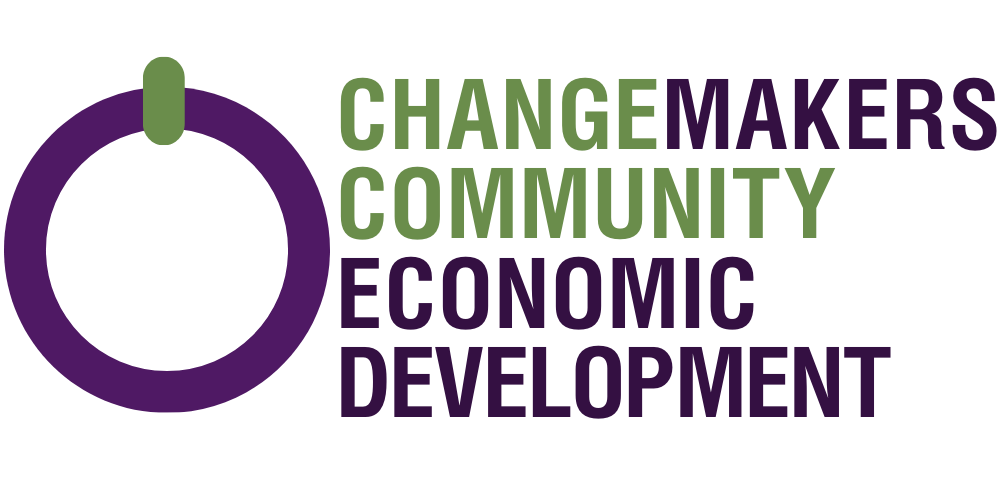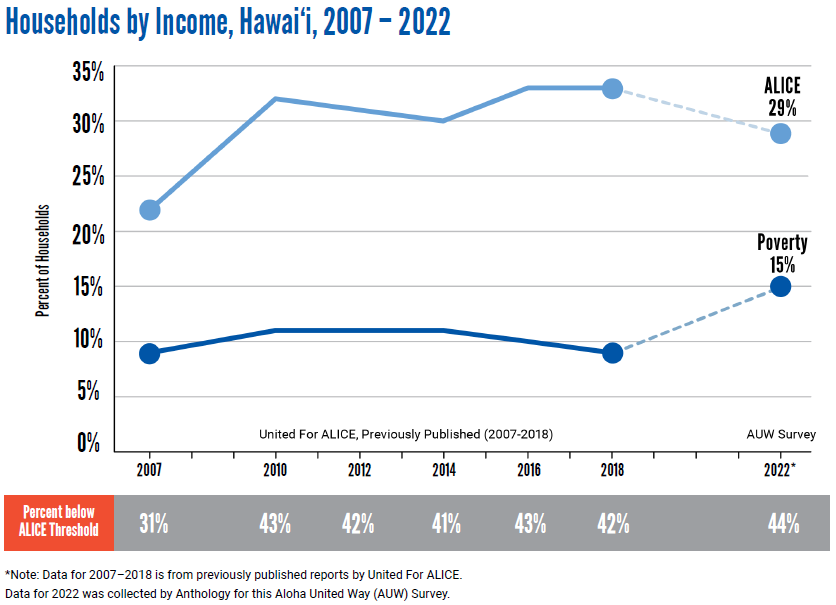Data Walk - Understanding ALICE
KanakaMob Data Walk:
Understanding ALICE in Hawaiʻi
In 2022, Aloha United Way, in partnership with the Financial Health Network and United For ALICE, released a comprehensive report shedding light on the financial challenges faced by many households in Hawai‘i.
This study is significant as it captures the ongoing impacts of the COVID-19 pandemic on Hawai‘i's residents. To read the full report, download it here.
WHAT IS ALICE?
ALICE stands for Asset Limited, Income Constrained, Employed. It refers to households that earn above the Federal Poverty Level (FPL) but still cannot afford basic living expenses such as housing, food, childcare, transportation, and healthcare. Despite being employed, these households struggle to make ends meet, living paycheck to paycheck.
KEY FINDINGS FROM THE REPORT
1. Increased Financial Hardship:
The number of households below the ALICE threshold rose to 44% in 2022, up from 42% in 2018
Households in poverty increased from 9% to 15% over the same period.
2. Disparities by Demographics and Geography:
Native Hawaiian and Filipino households are particularly affected, with 60% and 59% respectively falling below the ALICE threshold.
Neighbor island counties have higher percentages of ALICE households compared to Honolulu County.
3. Impact of COVID-19:
The pandemic exacerbated financial instability, pushing more households into poverty and deepening financial struggles for those already near the ALICE threshold.roots.
Mental health issues, difficulty paying debts, and challenges in affording housing are the most common ongoing impacts.
4. Economic Characteristics:
The vast majority of ALICE households (84%) have combined annual incomes below $75,000, equivalent to two full-time wage earners making $18 per hour.
Nearly half of ALICE households would only be able to cover expenses for two months or less in case of a financial crisis.
More than 1 in 3 households below ALICE have more debt than is manageable.
THE BROADER IMPLICATIONS
ALICE households are integral to the community, encompassing workers in essential roles such as teachers, medical assistants, and childcare providers. The financial strain on these households indicates systemic issues of wealth inequality and inadequate economic policies that fail to support a significant portion of the population. Addressing these issues requires comprehensive policies and community efforts to provide financial stability and economic mobility for all residents.
QUESTIONS FOR REFLECTION
Please review these questions and answer one or all of them in the comment section below. We want to hear from you. The heart of KanakaMob is your input. Together we can work toward viable and sustainable solutions.
1. How can local and state policies better support ALICE households in achieving financial stability?
2. What community-based initiatives could help bridge the gap for households struggling below the ALICE threshold?
3. In what ways has the COVID-19 pandemic highlighted or exacerbated existing financial inequalities in Hawai‘i?
4. How can we address the specific needs of the most affected groups, such as Native Hawaiian households?
5. What role can KanakaMob play in supporting the financial health and well-being of ALICE households?
Join the conversation and share your thoughts and ideas by commenting below.
By commenting, you agree to our Rules for Engagement.
-
ChangeMakers Hawaiʻi strives to create a respectful and constructive space for everyone. Here are our guidelines for leaving comments and sharing opinions:
Be Respectful: Treat others as you would like to be treated. No insults, bullying, or derogatory remarks.
Stay Constructive: Focus on providing helpful feedback and innovative solutions. Critique ideas, not people.
Encourage Positivity: Share thoughts that contribute to a supportive and encouraging environment.
Be Relevant: Ensure your contributions are pertinent to the topic discussed.
Respect Privacy: Do not share personal information about yourself or others.
By engaging here, you agree to these rules. Comments that fail to adhere may be removed to maintain a positive community. Mahalo for helping us build a place where everyone can contribute meaningfully!









